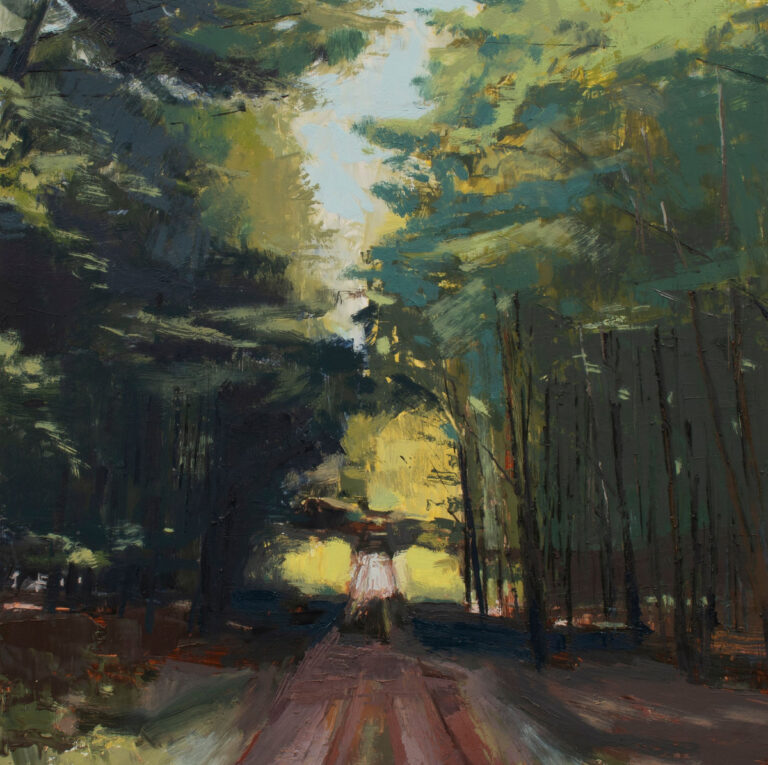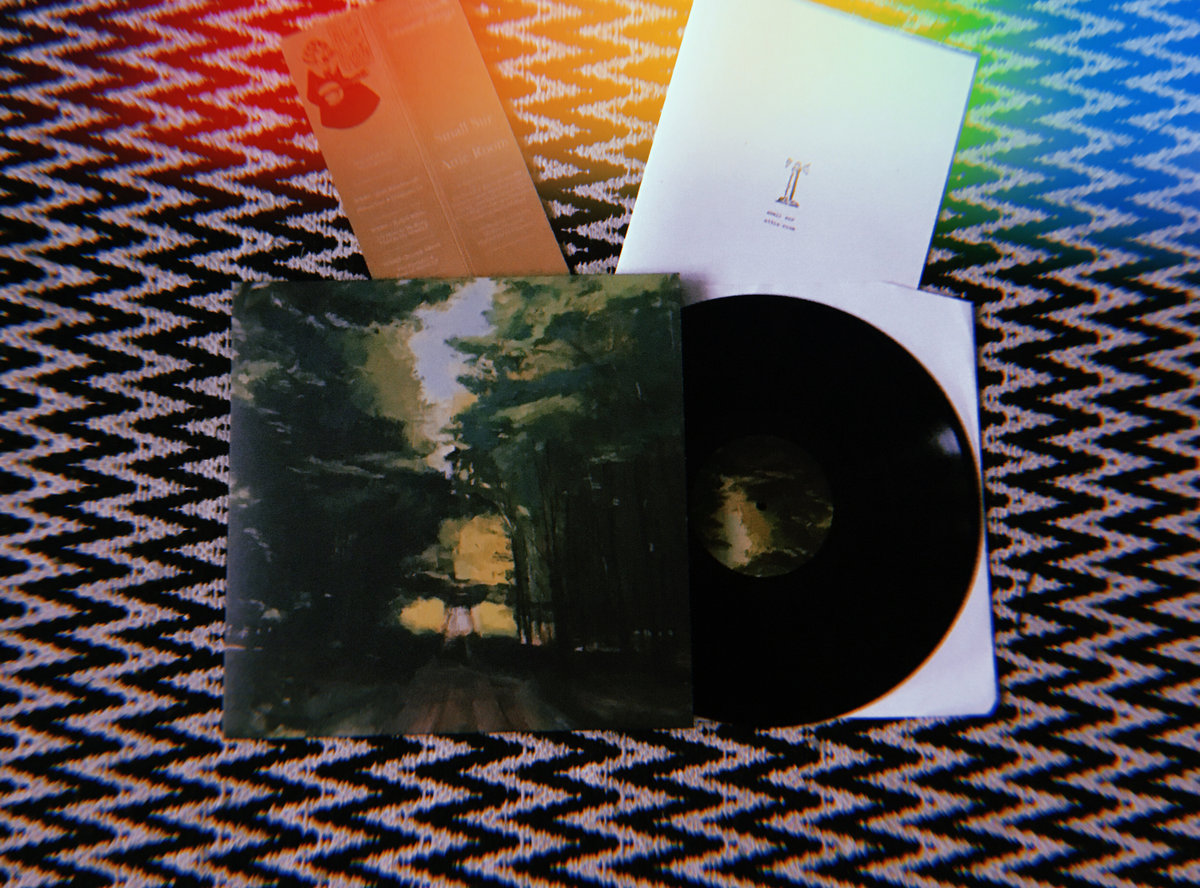“What is love if not a study in time?” So asks a line in an early track on Attic Room, the new album by Small Sur out now on UK label Worried Songs. Focusing its lens on rhythms both personal and universal, the record paints evocative, impressionistic sketches of places and moments at its own measured pace. An effort to capture the simple beauty of the natural world and domestic life, as well as the uncertainty and reassurance inherent within cycles of inevitable change. Attic Room, as the press release succinctly puts it, “finds strength and grace in transience.”
The project of Baltimore’s Bob Keal, Small Sur has released four albums (as well as a couple of singles and an EP) over the last decade and a half. Attic Room is the first Small Sur album since 2013’s Labor, and more significantly, it is also the first since the birth of Keal’s daughter in 2014. During these intervening years, he created “hundreds of song fragments scratched into the margins of life,” and spurred on by sound engineer Matthew O’Connell (Chorusing) and his brother Joseph (aka Elephant Micah), Keal began the laborious process of sifting through this collection of voice memos and half-formed ideas, eventually hammering them into ten completed songs.
But the next steps were far from simple. Forced by the pandemic to cancel a five-day recording session at a cabin in North Carolina in March 2020, Keal took a few months to deal with more pressing concerns before turning to alternative plans for the album. He began to work with O’Connell remotely, laying down his vocal and guitar work in the basement of a local chapel while O’Connell handled the engineering and played piano and Telecaster. Eventually they reached out to other collaborators too, the limitations on a conventional full-band setup paradoxically ploughing the earth for a different kind of community to grow.
Keal describes Attic Room as a “bedroom country” record, a tag anyone familiar with the Small Sur oeuvre will intuitively understand. Keal makes music that is quiet and minimal, intimate in the truest sense. The sound of one person’s experience of life here on Earth, focusing not on grand narratives but the gentle wax and wane of everyday existence. The new album evokes images of weather patterns (such as the thundercloud of opener ‘A Clean Patch of Ground’), the changing seasons and countless small moments that are infused with a poetic gravity. Moments like the day’s last cigarette (‘Rays of Light’), watching harbour lights reflecting on dark nighttime water (‘Monhegan Island, 2012’), or even the warm-hued tones of a cherished memory (‘Aperture’).
It’s high tide in Tucson
and I’m bathing in the sun
in those western waters gleaming
with my lover in my arms
[bandcamp width=100% height=120 album=999106836 size=large bgcol=ffffff linkcol=0687f5 tracklist=false artwork=small track=1838093077]
Small Sur has always excelled in these fine details, and Attic Room therefore fits neatly into the discography. But there are changes too, as is to be expected for work so inherently personal. Just like the landscapes and relationships he explores, Keal is slowly changing. Because of fatherhood and his relationship with his partner, not to mention the challenges of the last few years.
Nowhere is this new perspective more apparent than on ‘Sun’, a song which harks back to another called ‘I Love the Sun’ from 2008’s We Live in Houses Made of Wood. As its title suggests, the original was a simple ode to the most important star (“I love the sun /And its rays / Which fall by day from the heavens”). ‘Sun’ is the same song but sung from a different position, Keal now sharing his appreciation with his daughter. “I will show you the sunrise,” he sings, “in the meadow at dawn.” It’s a moment that, perhaps inadvertently, captures the essence of the record—the idea of finding fortitude and beauty in time passing, in cycles repeating, in the fact the sun continues to rise and set despite whatever else is going on in the world. What is love, after all, if not a study in time?
Congratulations on the release of Attic Room. How does it feel to have a new record out in the world?
Thank you! I haven’t recorded much since our last full-length, Labor, from 2013, so I feel happy to have some new music in people’s ears. It’s a bit surreal, too, mostly because of how people consume music these days, even compared with 2013. It feels like there is so much music being released—not sure if that’s reality or just my perception—so I’m just really thankful a few folks have given the album some time to sink in.
As with most artists over the last few years, the recording process was far from a simple one. How did you manage to work around the restraints of the pandemic, and do you think the album sounds different because of the circumstances it was born in?
First and foremost, my co-conspirator, Matthew O’Connell of Chorusing and Elephant Micah, brought so much to the table in terms of technical know-how and creative input. He engineered most of the record and co-produced it with me. I stand by the songs themselves, but the album would’ve been very different if I’d recorded it live with a band and added a handful of overdubs afterward. That’s what I’ve done in the past because of time and budget constraints, and that approach has its limitations. Because of the pandemic, Matt and I hunkered down and built things up from their basic parts, usually starting with voice and nylon string guitar. I’ve always tried to layer in sounds and parts in a way that feels subtle and intentional, but our overall approach really allowed that to take center stage rather than being an afterthought. In the end, I don’t think this album would be what it is without the limitations, so that’s one of the few positives I’m taking away from the pandemic’s many negatives.
Although Small Sur is very much your project, you enlisted the help of a pretty stellar cast of collaborators. How big an influence did each individual bring to the record?
I’ve always loved inviting folks to put their own stamp on my songs. I offer my opinions and input, but the spontaneity of having others just going for it is really fun. Aside from Matthew’s technical contributions to the album, he also played on piano, Telecaster, tape dubs, bass, and percussion. Erik Hall delivered an incredible mix and played some crucial piano parts. Andy Stack of Wye Oak/Joyero had a huge impact on these recordings, too. He has a super intuitive approach and special relationship with my songs, and I loved what he brought to the table, as always. Andy Abelow has played saxophone on my songs for 15 years, and he has some amazing contributions here, too, as does Will Ryerson, who’s played bass in the band for almost a decade. Cara Satalino of Outer Spaces on backing vocals, Joseph Decosimo on fiddle, Dave Hadley on steel guitar, Joe O’Connell on bass—all incredible contributions, too, and I can’t imagine the record without them.
One unique part of making this record was that most folks did their own engineering. The feedback/revision loop is a bear when working remotely, so I tried to communicate what I was looking for pretty clearly and to also be flexible and run with folks’ ideas even if they weren’t exactly what I had in mind. It was pretty fun, and everyone who played on the album brought so much talent to the table that I didn’t feel the need to clutch too tightly to control. I feel so thankful to have friends and acquaintances who were willing to chip in to flesh these songs out, and I can’t imagine what the album would be without each and every one of their contributions.
This is your first release since the birth of your daughter, and while I’m sure this had a practical impact on the album’s creation, I’m interested in how parenthood and the idea of family seeped into the songs themselves. Are you a different songwriter now? Did you write these songs with your daughter in mind?
Aside from the song ‘For Juniper,’ which I specifically wrote for my daughter, I didn’t write any of the other songs with her in mind. Parenting in general and the partnership I have with my wife Monique played a huge role in the lyrical content of the album and my ability to have the time to make it. We’ve weathered a lot together in the 16 years of our friendship and relationship, especially leading up to and during the pandemic. Continually growing in my ability to be supportive and present through the peaks and troughs of life has been a welcome education, and my reflections on that experience are all over the album.
My approach to writing songs has changed over the last decade because I often only have short windows of time in which to work. Most of the voice memos and quick ideas I record have lots of ambient noise in the background: my daughter singing or screaming, dishes clanking, the dog barking or his nails clicking on the hardwood floor. It makes me think of some of Mick Turner’s recordings, especially Moth, and I’d love to incorporate some of those sounds in finished recordings sometime.
[bandcamp width=100% height=120 album=999106836 size=large bgcol=ffffff linkcol=0687f5 tracklist=false artwork=small track=4012713647]
The press release also refers to how the record evokes the “Midwestern landscapes of [your] childhood.” Does parenthood cast your mind back to your own childhood? Did you set out to explore these cycles of growth and development directly?
I’m a pretty nostalgic person, so I spend a lot of time thinking about my childhood and other past experiences. The farm in South Dakota where I grew up had a deep impact on who I am, and “place” in general has always inspired me—hence the name of the band and many songs named after specific places and times. I honestly don’t really set out to explore anything directly. Whatever happens just happens naturally.
Talking of cycles, nature has always been very present in your work. Again, is this intentional, or just something that happens as you write? And what is it about the natural world and its rhythms that can bring us so much strength and solace?
I am very intentional about spending time outside. My yearly goal is to sleep in a tent for three weeks, and on a good year I can push it close to a month. In the midst of these blocks of time, I am often—not always—calm and clear and open. During fall 2020, I wrote ‘For Juniper’ while camping in the Catskills. The lyrics and ideas that became ‘Sun’ were written while camping, too. I take great solace in the fact that I can return to places year after year and see things grow and shift and change. And I let those changes illuminate and reflect the shifts happening in my life, too. The natural world is the filter through which I understand and see my life in its clearest form. Some of the poets and songwriters I love most have similar approaches—Mary Oliver, Phil Elverum, Kyle Field of Little Wings, Joe O’Connell of Elephant Micah—so that surely inspires my work and funnels my approach in some way, too
[bandcamp width=100% height=120 album=999106836 size=large bgcol=ffffff linkcol=0687f5 tracklist=false artwork=small track=4153047341]
Attic Room is out now. Order it via Worried Songs or the Small Sur Bandcamp page.


